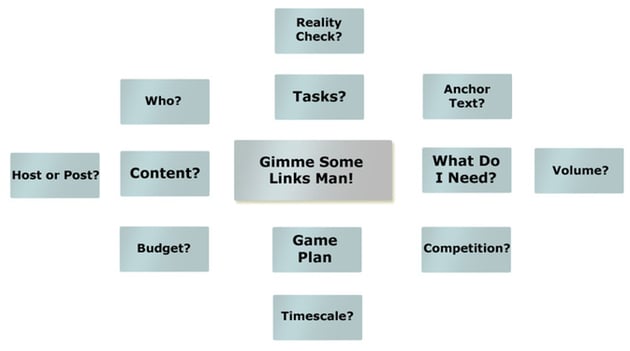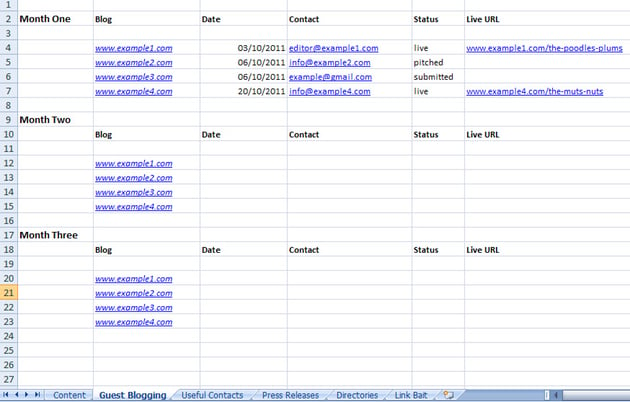Brainstorming Your Link-Building Strategy
Often when client arrives in need of links, it can be fairly daunting trying to figure out how the heck you’re going to get the link juice you need. Coming up with a structured plan that works is something I’ve been trying to improve over the last year or so, and I’m pretty sure it’s something I’ll be refining for many years to come. At the start of every campaign I’m involved with, I try to sit down and thrash out a load of ideas in an effort to come up with a link-building ‘road map’ to follow for the coming months.
I find having a solid plan useful in two ways. Firstly, for the client, I think it’s really good for them to understand what you are doing with the time they are paying for. In my experience, it really helps to sit down with them and say I’m going to be doing this much of ‘x’ and this much of ‘y’ because of ‘a, b, and c.' Being able to report back on this structured activity will definitely go down well with your clients. This open explanation of your plan creates a good transparent relationship with the client, and hopefully, one that will also stand the test of time.
Secondly, having a clear plan to follow is brilliant for me. Having a clear set of tasks allows me to manage my time much more effectively and ensures that I don’t fall behind on anything. Being freelance, I don’t have a boss to keep check on me so it’s vital that I keep track of what I’m working on and what I need to work on before the month is over. Sure, things are likely to change along the way, but it’s always useful to understand what you’re changing and why.
Here are some of the things I like to think about when coming up with a game plan.

1. Requirements – What Links Do I Need?
The first part of any solid link-building strategy should be trying to establish what links your client needs. Depending on the situation, you might either need to do a full backlink analysis or alternatively spend half-an-hour or so getting a quick ‘feel’ for things. Either way, it’s a step that shouldn’t be skipped.
For me, this falls into two stages:
Checking existing links – Using both Open Site Explorer (OSE) and Majestic SEO, I try to build up a good picture of what links are already coming into the website. How many linking root domains are there? What’s the anchor text balance like? How have they been building links in the past? All of these questions will go some way to determining what type of links I might want to prioritise.
For example, if your new client has a brand new domain with no links, then you will probably want to tread extremely carefully with your link-building. However, you might find out that your new client has gone way overboard with exact match anchor text, which will mean that balancing out the anchor text should become a focus for you.
Checking the competition – This is where things can start to get really interesting. Checking out the competition is a vital step in understanding what you might be going up against. Armed with that information, you can start to get an idea of what you might need to do in order to rank well, and how long it might take you to get there. Having some good insight into your competitor's link profile will also help you to track changes and understand shifts in the SERPS; all great information to be armed with!
I usually start this process off by tracking who’s ranking in the top ten for a variety of my main keywords. Once I’ve got a good idea of who’s hanging around, I’ll then download a full OSE report for the top ten results for each keyword. I can then look at numbers of linking root domains, anchor text spread, and many more things that will help determine what I might need to do. Justin Briggs wrote an amazing post on link analysis that goes into some great detail on the subject; I strongly suggest you read it!
Key Questions:
- How many linking root domains shall I aim for?
- What anchor text am I aiming for?
- How is the competition getting their links?
2. Timescales and Budgets
This is sadly one of the biggest factors that can affect your potential link-building strategy. It’s important to get a good idea of how much budget and time you will have available to you before you start thinking up a load of wonderful ways to build links. There’s no point in dreaming up ways to start promoting your amazing infographics and embeddable content if you don’t have any budget to create anything. That being said, there are always ways to build content and links for any budget (within reason of course!)
If the budget is tight, then it might be worth considering writing some great guides and resources to help establish your client as a trustworthy source of information. So long as you have the time to research and be creative, writing a good piece of link-worthy content shouldn’t have to cost the earth.
Key Questions:
- How much money do I have to spend on content?
- Do I have a budget for high-level directory submissions, press release distribution, etc?
- How much time can I give to this project?
3. Resources
By resources, I mean anything. Anything that you can draw on to help enhance what you’re doing. This is where being sociable, friendly, and a little bit persuasive can really help with your link-building. Do you have great designers you can call on? Do you know some fantastic writers? Does either you or the client have specialist knowledge that could be called on to create some useful resources? The word "resources" doesn’t just have to mean financial resources and number of staff; in my book, it means ANYTHING that could be useful in creating content, spreading the brand, and of course, gaining some juicy links.
Key Questions:
- Who do I know?
- Can the client get involved?
- How creative can we get?!

(Figuring out a plan getting to you? Just don’t end up like Crazy Harry... Photo credit)
4. Content – Post or Host?!
We all know that hosting great content on your website can help establish you as a great source of information, and hopefully start to bring in links naturally. So it’s definitely something you need to think about. But placing content on other websites is also a great way of building links, especially if you’re a new website trying to build a reputation from scratch.
Hosting content on your own site – Personally I see this as a must for any website. If your content and website sucks, then your success is going to be relatively limited. Writing great resources and promoting your own great content will help you build traffic, links, and social activity. However, can the website easily facilitate new content? Is your client willing to promote free content? These are a couple of things that could stand in your way, and working out how to get round them should definitely be planned for.
Posting content on other sites – If you’re working on a new website, then it might be some time until the links start to build up naturally. Going out and placing content on other websites is a fantastic way to build links and reputation. Using services like MyBlogGuest will help you to find some really good websites that are looking for content in your niche.
Key Questions:
- How much content can I/we create?
- Who’s going to be working on the content – me/client/third party?
- Where can I find a list of potential sites to post content on?
5. Specific Tasks
By now, you should be gathering a few pretty decent ideas together of where you might be headed with your link-building campaign. The real skill is turning all of this information into realistic tasks that can fit into the timescales the project allows. I think the key here is being ‘realistic.' Your strategy has to work for the project and give the client as much value as possible, but also not cause you to be overworked and underpaid.
I don’t think it’s very valuable to say ‘we’re going to make some link bait.' It’s far better to come up with specific tasks such as:
- Source a designer
- Gather a list of key industry figures/bloggers
- Release the content via your social network/paid discovery
- Track key metrics of the latest link bait
Going back to the point I made at the beginning, it’s always really useful to have a list of tasks to keep yourself in check and also to help feedback on progress to the client. Knowing what you need to do and when should help keep the wheels rolling. There are plenty of project management tools out there, but I tend to use a simple spreadsheet with a tab for ‘each task area.' Each tab can then contain specific month-by-month details of each task, with a detailed breakdown of the steps along the way:

Spending that little bit of extra time making some detailed plans should help you to work more efficiently and to keep focused throughout.
6. Don’t Fear Change
Whatever your plan includes, try not to worry about changing it along the way if you find that something isn’t working out as well as you might have hoped. It’s often the case that some things work out really well and produce more than what you expected, while other things simply never take off. Try to carry the mantra of ‘fail fast.' If something’s not working out, then tweak, change, and tweak again until you hit that magic balance.
Having a detailed plan will mean that you can track everything you’re doing, so any changes you make will hopefully be well-informed.
As a last note, I thought I’d mention a few of the best resources I’ve read recently (SEOmoz and others) that have definitely helped shape the way I plan and research link building strategies. If you haven’t read these then go and do it now!
- Clockwork Pirate – Free link building EBook from Kelvin Newman
- Guide to Competitive Backlink Analysis – Justin Briggs
- Actionable Link-Building Strategies – Paddy Moogan
- Competitive Backlink Analysis – Jane Copland
- Effective Link Building - Justin Briggs Webinar
About me: I run my own SEO consulting business Go Search Marketing and have worked with a large variety of clients in different industries. I also have the pleasure of running my own ecommerce site The Jewellery Boutique. Feel free to come say hi and pop me any questions on Twitter @jonquinton1.
The author's views are entirely their own (excluding the unlikely event of hypnosis) and may not always reflect the views of Moz.




Comments
Please keep your comments TAGFEE by following the community etiquette
Comments are closed. Got a burning question? Head to our Q&A section to start a new conversation.